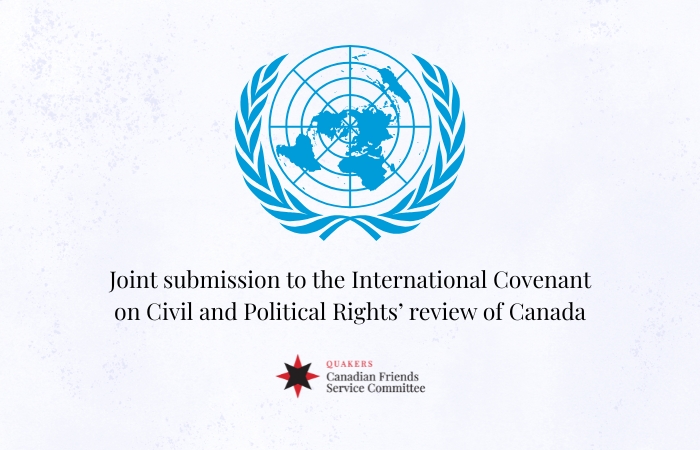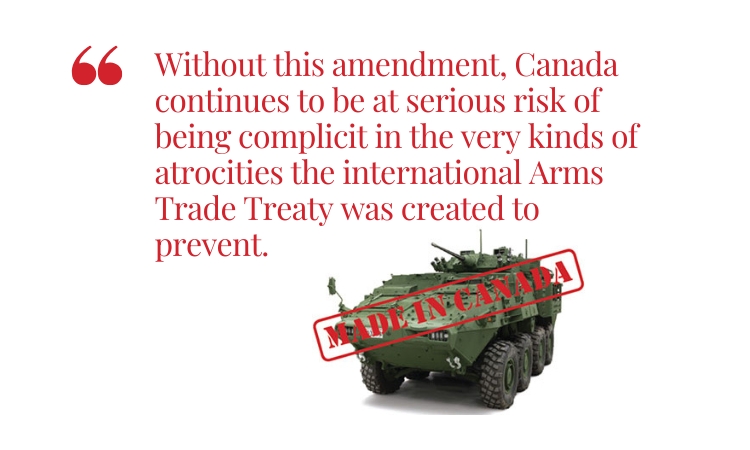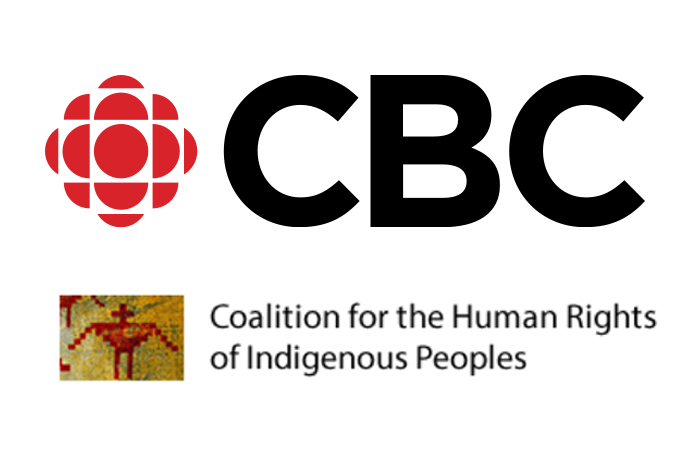
Coalition for the Human Rights of Indigenous Peoples provides support to CBC on its new National Indigenous Strategy
January 31, 2024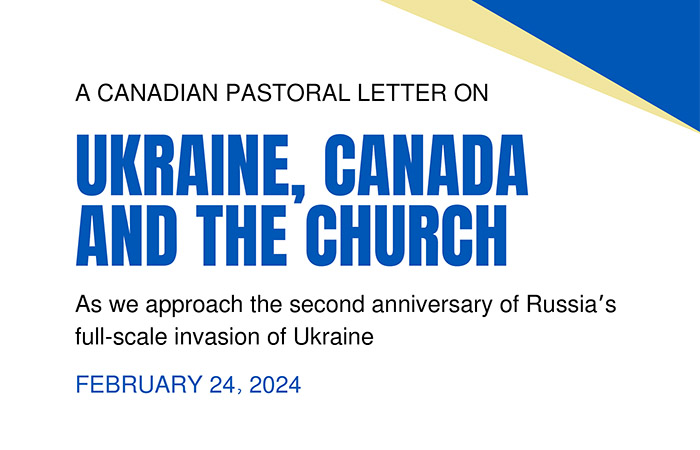
Open letter from Canadian churches on Ukraine
February 21, 2024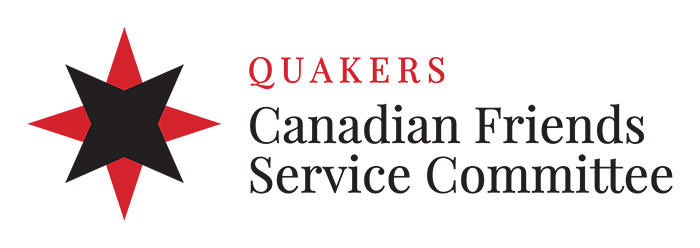
Government budgets might not sound all that exciting. But they matter greatly to the peace and social justice issues that Canadian Quakers care about and work on. For that reason, Canadian Friends Service Committee has made the following written submission for the pre-budget consultations in advance of the upcoming Federal Budget.
Summary of recommendations
Recommendation 1:
Advancing reconciliation through sustained and diligent progress on implementing the TRC Calls to Action, and the UN Declaration Act and National Action Plan.
1.a) Provide sufficient and sustained long-term funding for the National Council for Reconciliation so that it can monitor and report on all progress with reconciliation in Canada.
1.b) Substantive action needs to take place in full cooperation with Indigenous peoples regarding implementation of the Declaration Act. A plan with funding attached is needed to help provinces and territories develop and pass legislation that brings them into alignment with the UN Declaration Act.
1.c) Government spending cuts should not be applied to Indigenous Services Canada and Crown Indigenous Relations.
Recommendation 2
Make substantive investments in community-based organizations to ensure the successful implementation of the Federal Framework to Reduce Recidivism.
2.a) Enhance access to community-based supports and services that meet the specific needs of the families and children of people who are incarcerated.
2.b) Expand on successful alternative sentencing programs and invest in innovative best practice solutions that can address the over-representation of Indigenous, Black, and racialized Canadians in custody, especially Indigenous women who represent 50% of women currently incarcerated.
2.c) Adopt Bill S-233 An Act to develop a national framework for a guaranteed livable basic income.
Recommendation 3
Increase funding to Canada’s Peace and Stabilization Operations Program (PSOPs) from $100m to $125m over two years.
3.a) In particular, focus on investing and enhancing Canadian CSO expertise in peacebuilding strategies that would be cost effective when applied to areas of tension/conflict.
3.b) Support the Canadian Peace Partners Network (CPPN) to develop a peace lens to apply to all projects/programs of PSOPs and GAC on par with their gender-responsive approach and Feminist International Assistance Policy.
Recommendation 4
Increase the international assistance envelop to $8.9 billion to maintain Canadian international commitments and address global inequality while also allowing Canada to be responsive to new and emerging humanitarian crisis.
Introduction
Canadian Friends Service Committee (CFSC) is the peace and social justice agency of the Religious Society of Friends (Quakers). For centuries, Quakers have been exploring the tough question of how to respond effectively to violence, in all its forms; interpersonal, nation-to-nation, systemic and institutional. In trying to address the underlying factors and causes of violence particularly in Canada, CFSC focuses its work on Indigenous peoples’ human rights, transformative justice, and peace.
Indigenous peoples’ human rights
Over the past decade Canada has made great strides in laying the groundwork for reconciliation with Indigenous peoples. There are the 94 Calls to Action from the Truth and Reconciliation Commission, the National Action Plan on Missing and Murdered Indigenous Women, Girls, and 2SLGBTQQIA+ People, and most recently the National Action Plan on the United Nations Declaration on the Rights of Indigenous Peoples Act. However, there remains much work left to do. Diligent and sustained progress is needed to ensure implementation of all the above-mentioned plans and tools to move forward on reconciliation. An excellent next step would be the sufficiently resourced and funded National Council for Reconciliation.
Bill C-29, An Act to provide for the establishment of a National Council for Reconciliation provides for the monitoring, evaluation, and reporting on progress being made towards reconciliation across all levels of government and sectors of Canadian society. The establishment of such a Council comes out of the Calls to Action #53-56 and supports meaningful progress towards reconciliation. However, if the council is under-resourced and insufficiently funded, it runs the risk of being a performative act and not a substantive change. The endowment fund of $126.5m is not sufficient to adequately fulfill the mandate as set out in the Bill.
The Senate amendments to Bill C-29 and observations in the Fifteenth Report of the Standing Senate Committee on Indigenous Peoples, highlight the importance that the Council be: an independent, Indigenous-operated organization; that it have the ability to ask for and receive data and information relevant to its work in a timely fashion, and; it receive a larger endowment as well as access to long-term, multi-year funding. Having those conditions met would make the Council an important instrument to depend upon in measuring the success of Canada’s steps towards reconciliation.
Passing the United Nations Declaration on the Rights of Indigenous Peoples Act (Declaration Act) in 2021 was a monumental step towards reconciliation. CFSC welcomed the passing of the legislation alongside partners and Indigenous peoples after working for decades on getting the legislation passed.
June 2023 saw the release of the National Action Plan for the implementation of the Declaration Act. An important component for implementation (and reconciliation) is the legislative adoption of the UN Declaration in every province and territory across Canada.
To date British Colombia and the Northwest Territories are the only province and territory to pass legislation and can set the precedent for other provinces and territories to follow. As the Declaration Act is federal legislation, it is incumbent on the government to plan and develop a strategy, in consultation with provincial and territorial counter parts and with Indigenous peoples, for the adoption of the UN Declaration in all the jurisdictions in Canada.
In order to maintain momentum and forward progress on reconciliation, the government should not apply any funding cuts to Indigenous Services and Crown Indigenous Relations as was requested by the President of the Treasury in budget tightening measures asked of all government ministries and departments. Reconciliation progress can be precarious, and the government has already identified that there are inequities and disparities in services received by Indigenous communities. Spending cuts could further exacerbate these inequities and should not happen. While spending cuts are a necessary measure to reign in budgetary excess, Indigenous Services should be spared, keeping Canada in line with its obligations and promises on reconciliation.
Transformative justice
The Federal Framework to Reduce Recidivism Act, 2021 (FFRR) instructs the Federal Department of Public Safety to study and take steps to address the root causes of recidivism in the correctional systems in Canada. Today, 25% of persons released from jail are back in jail within two years (the rate is 40% in Indigenous communities). The law mandates the government to report annually on plans made, steps taken, and progress toward the goal of reducing recidivism in Canada’s correctional systems. It encourages looking abroad for promising innovations and being bold and creative with pilot projects. It also highlights the successful community-based services and supports offered by leading interfaith and civil society organizations (CSO). These CSO community support services play an oversized role in reducing recidivism but have not received, or been allocated with, increased funding. What is needed is consistent, stable, long-term funding that considers inflationary increases to maintain and strengthen existing support structures.
The FFRR is a hopeful step towards a better and more organized framework targeting the underlying causes at play when individuals become criminalized. However, with the recent release of the Implementation Plan, there is now a worry that effective measures and resources have not been properly identified and allocated within the Plan.
An area that requires more consideration and can have a direct impact on recidivism rates, as it strengthens families, is taking the best interests of children as primary at all stages of decision-making within the criminal justice system (decisions affecting parents before the courts, incarcerated, or completing their sentences in the community).
Taking the best interest of children into consideration is highlighted by the United Nations Convention on the Rights of the Child (UNCRC) Concluding Observations of Canada’s 5th 6th Review #19 (a): “Ensure that the right of the child to have his or her best interests taken as a primary consideration is appropriately integrated and consistently interpreted and applied in all legislative, administrative and judicial proceedings and decisions”, and from Minister Mendocino’s statement introducing the FFRR, “Evidence in the correctional literature has suggested that the mother-child bond may be critical for successful reintegration into the community. When strong familial ties are maintained by women offenders, research has found there to be less likelihood of recidivism”.
Therefore, increased funding and resources are needed for children of incarcerated parents and their families. These include comprehensive mental health, housing, trauma informed services, availability of healing services, and alternatives to incarceration that provide safer environments for children.
These measures that maintain and encourage familial bonds could also be useful in tackling the disproportionate rates of incarceration of Indigenous, Black, and racialized Canadians. This is an urgent issue to address as Indigenous overrepresentation amongst incarcerated individuals continues to rise.
Released in June 2023, the report Ten Years Since Spirit Matters: Indigenous Issues In Federal Corrections (Part II), by Correctional Investigator of Canada Dr. Ivan Zinger states that: “On nearly every measure of correctional performance—time spent behind bars before first release, placements in maximum-security institutions, involvement in use of force, recidivism and revocation rates, suicide and self-injury, placement in restrictive confinement units—the correctional system seems to perpetuate conditions of disadvantage and discrimination for Indigenous people.” When we consider the Truth and Reconciliation Commission’s Calls to Action #30-42 (the Calls that relate to justice: overrepresentation of Indigenous people in custody, community sanctions and realistic alternatives to incarceration, allowing for the departure from mandatory minimum sentences, under utilization of healing lodges, culturally appropriate programs and supports, etc.), this statement shows that greater investment in proven, evidenced-based community supports is urgently needed and cannot be delayed.
A concrete measure that compliments the FFRR would be to adopt Bill S-233 An Act to develop a National Framework for a Guaranteed Livable Basic Income. This Bill addresses the root causes of violence and crime. Research and evidence show that the root causes of violence and crime emerge from systemic issues of discrimination, racism, inequity, and other social determinants. It is important to educate Canadians and demonstrate that a guaranteed livable basic income will support community safety and will reduce safety concerns.
There is a real need to transform the justice system and approach it from a new perspective. Bill S-233 would lay the groundwork for such a transformation. This could lead to a so called ‘social determinants of community safety’ approach, which should be considered and adopted by the government and given adequate funding. Such an approach involves community sentencing alternatives, employment programs and supports, poverty reduction methods, restorative justice approaches, and healing lodges, among many other alternative approaches to justice to increase community safety.
Peace
Peace has been linked to Canada’s identity by many Canadians since Lester Pearson’s role in developing peacekeeping through the UN Emergency Force. However, today Canada has very few peacekeepers and the momentum for innovation and leadership for peace has dissipated. It is an identity that should be reclaimed. Canada has made some strides in innovation by applying a gender responsive approach to development assistance, the creation of the feminist foreign policy and its commitment to the Women, Peace and Security Agenda.
The importance of mainstreaming gender equality as one way toward a more peaceful, secure, and prosperous world cannot be understated and has had impact. New innovative approaches are needed as we see tensions and conflicts emerging more rapidly and with the capacity of destabilizing entire regions quickly. Peacebuilding solutions are more necessary then ever.
The Peace and Stabilization Operations Program (PSOPs) of Global Affairs is best placed to enhance and work with Canadian CSOs to develop a new framework with which to consider conflict and development. Investing in the Canadian Peace Partners Network (CPPN), which sits in and is co-chaired by PSOP, is a logical place to start. The more than 40 Canadian CSOs that form part of the CPPN are utilizing innovative approaches to peacebuilding through their various projects and have the on-the-ground connections to concretely demonstrate the potential within alternative forms of conflict prevention/resolution.
With increased funding, PSOPs could harness innovative policy solutions like the development of a peace lens alongside the gender lens when it comes to decision making. The risks of not investing in new solutions that can be applied to decision making and foreign policy implementation can be costly both in terms of money and humanitarian strife. Canada’s history of peacekeeping and peacebuilding and relative influence on the world stage provide the conditions that enable it to consider new approaches to non-traditional methods of peace and security.
It is also important to ensure and sustain adequate funding of the International Assistance Envelope (IAE) which was reduced in the previous budget. Increasing funding to at least $8.9B is necessary to ensure the continuation of support to the programs and projects that need increased funding due to the inflationary pressures that have emerged post-COVID and need to be taken into account.
Increased funding and investments in innovations to its IAE will keep Canada inline with its international commitments and obligations and restore its place as a defender of peace and human rights.
Download this submission in PDF.


